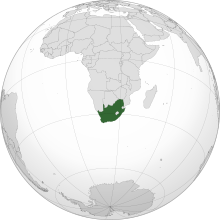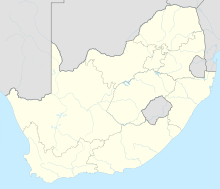
Back Аладатәи Африка AB Afrika Tunong ACE Къыблэ Африкэ Республикэ ADY Suid-Afrika AF Südafrika ALS ደቡብ አፍሪካ AM South africa AMI Sudafrica AN Sūðaffrica ANG दक्षिण अफ्रीका ANP
Republic of South Africa 10 other official names[1]
| |||||||||||||||||||||
|---|---|---|---|---|---|---|---|---|---|---|---|---|---|---|---|---|---|---|---|---|---|
| Motto: "ǃke e: ǀxarra ǁke" (ǀXam) "Unity in diversity" | |||||||||||||||||||||
| Anthem: "National anthem of South Africa" | |||||||||||||||||||||
| Capital | |||||||||||||||||||||
| Largest city | Johannesburg[3] | ||||||||||||||||||||
| Official languages | 12 languages[1][4]
Languages with special status[5] | ||||||||||||||||||||
| Ethnic groups (2022[6]) |
| ||||||||||||||||||||
| Religion (2016)[7] |
| ||||||||||||||||||||
| Demonym(s) | |||||||||||||||||||||
| Government | Unitary parliamentary republic with an executive presidency | ||||||||||||||||||||
| Cyril Ramaphosa | |||||||||||||||||||||
| Paul Mashatile | |||||||||||||||||||||
| Amos Masondo | |||||||||||||||||||||
| Vacant | |||||||||||||||||||||
| Raymond Zondo | |||||||||||||||||||||
| Legislature | Parliament | ||||||||||||||||||||
| National Council | |||||||||||||||||||||
| National Assembly | |||||||||||||||||||||
| Independence from the United Kingdom | |||||||||||||||||||||
• Union | 31 May 1910 | ||||||||||||||||||||
| 11 December 1931 | |||||||||||||||||||||
• Republic | 31 May 1961 | ||||||||||||||||||||
| 4 February 1997 | |||||||||||||||||||||
| Area | |||||||||||||||||||||
• Total | 1,221,037 km2 (471,445 sq mi) (24th) | ||||||||||||||||||||
• Water (%) | 0.380 | ||||||||||||||||||||
| Population | |||||||||||||||||||||
• 2022 census | 62,027,503[8] (23rd) | ||||||||||||||||||||
• Density | 50.8/km2 (131.6/sq mi) (169th) | ||||||||||||||||||||
| GDP (PPP) | 2024 estimate | ||||||||||||||||||||
• Total | |||||||||||||||||||||
• Per capita | |||||||||||||||||||||
| GDP (nominal) | 2024 estimate | ||||||||||||||||||||
• Total | |||||||||||||||||||||
• Per capita | |||||||||||||||||||||
| Gini (2014) | very high | ||||||||||||||||||||
| HDI (2022) | high (110th) | ||||||||||||||||||||
| Currency | South African rand (ZAR) | ||||||||||||||||||||
| Time zone | UTC+2 (SAST) | ||||||||||||||||||||
| Date format | Short formats: | ||||||||||||||||||||
| Driving side | left | ||||||||||||||||||||
| Calling code | +27 | ||||||||||||||||||||
| ISO 3166 code | ZA | ||||||||||||||||||||
| Internet TLD | .za | ||||||||||||||||||||
South Africa, officially the Republic of South Africa (RSA or R.S.A.), is the southernmost country in Africa. It is bounded to the south by 2,798 kilometres (1,739 mi) of coastline that stretches along the South Atlantic and Indian Oceans;[14][15][16] to the north by the neighbouring countries of Namibia, Botswana, and Zimbabwe; and to the east and northeast by Mozambique and Eswatini. It also completely enclaves Lesotho.[17] It is the southernmost country on the mainland of the Old World, and the second-most populous country located entirely south of the equator, after Tanzania. South Africa is a biodiversity hotspot, with unique biomes, plant and animal life. With over 62 million people, the country is the world's 23rd-most populous nation and covers an area of 1,221,037 square kilometres (471,445 square miles). Pretoria is the administrative capital, while Cape Town, as the seat of Parliament, is the legislative capital. Bloemfontein has traditionally been regarded as the judicial capital.[18] The Constitutional Court, the country's highest court, is located in Johannesburg.
About 80% of the population are Black South Africans.[6] The remaining population consists of Africa's largest communities of European (White South Africans), Asian (Indian South Africans and Chinese South Africans), and multiracial (Coloured South Africans) ancestry. South Africa is a multiethnic society encompassing a wide variety of cultures, languages, and religions. Its pluralistic makeup is reflected in the constitution's recognition of 12 official languages, the fourth-highest number in the world.[16] According to the 2011 census, the two most spoken first languages are Zulu (22.7%) and Xhosa (16.0%).[19] The next two are of European origin: Afrikaans (13.5%) developed from Dutch and serves as the first language of most Coloured and White South Africans; English (9.6%) is commonly used in public and commercial life, both reflecting the legacy of Dutch and British colonialism, respectively.
Regular elections have been held for almost a century in the country. However, the vast majority of Black South Africans were not enfranchised until 1994. During the 20th century, the black majority sought to claim more rights from the dominant white minority, which played a large role in the country's recent history and politics. The National Party imposed apartheid in 1948, institutionalising previous racial segregation. After a largely non-violent struggle by the African National Congress and other anti-apartheid activists both inside and outside the country, the repeal of discriminatory laws began in the mid-1980s. Since 1994, all ethnic and linguistic groups have held political representation in the country's liberal democracy, which comprises a parliamentary republic and nine provinces. South Africa is often referred to as the "rainbow nation" to describe the country's multicultural diversity, especially in the wake of apartheid.[20] According to the 2023 V-Dem Democracy indices, South Africa is ranked the 51st electoral democracy worldwide and the 3rd electoral democracy in Africa.[21]
South Africa is a middle power (regional superpower) in international affairs; it maintains significant regional influence and is a member of both the Commonwealth of Nations and the G20.[22][23] It is a developing country, ranking 109th on the Human Development Index, the 7th highest on the continent. South Africa is the only African nation to legislate same-sex marriage.[24] It has been classified by the World Bank as a newly industrialised country and has the third-largest economy and the most industrialised, technologically advanced economy in Africa overall,[25] as well as the 41st-largest economy in the world.[26][27] South Africa has the most UNESCO World Heritage Sites in Africa. Since the end of apartheid, government accountability and quality of life have substantially improved.[28] However, crime, poverty, and inequality remain widespread, with about 40% of the total population being unemployed as of 2021[update],[29] while some 60% of the population lived below the poverty line and a quarter lived below $2.15 a day.[30][31][32] Having the highest Gini coefficient of 63.0, South Africa is considered to be one of, if not the most, unequal countries in the world.[33][34]
- ^ a b The Constitution of the Republic of South Africa (PDF) (2013 English version ed.). Constitutional Court of South Africa. 2013. Archived (PDF) from the original on 23 August 2018. Retrieved 17 April 2020.
- ^ a b c "South Africa at a glance". South African Government. Archived from the original on 26 May 2020. Retrieved 18 June 2020.
- ^ "Principal Agglomerations of the World". Citypopulation.de. Archived from the original on 25 December 2018. Retrieved 30 October 2011.
- ^ "The NA Approves South African Sign Language as the 12th Official Language". Parliament of South Africa. 3 May 2023. Archived from the original on 22 December 2023.
- ^ The Constitution of the Republic of South Africa (PDF) (2013 English version ed.). Constitutional Court of South Africa. 2013. ch. 1, s. 6. Archived (PDF) from the original on 23 August 2018. Retrieved 17 April 2020.
- ^ a b Mitchley, Alex. "SA's population swells to 62 million - 2022 census at a glance". News24. Retrieved 11 October 2023.
- ^ "South Africa – Community Survey 2016". www.datafirst.uct.ac.za. Archived from the original on 25 November 2018. Retrieved 25 November 2018.
- ^ "Census 2022 (pg.14-15)" (PDF). www.gov.za. Government of South Africa. 10 October 2023. Retrieved 18 October 2013.
- ^ a b c d "World Economic Outlook Database, April 2024 Edition. (South Africa)". www.imf.org. International Monetary Fund. 16 April 2024. Retrieved 17 April 2024.
- ^ "Gini Index". World Bank. Archived from the original on 29 May 2020. Retrieved 25 September 2018.
- ^ "Human Development Report 2023/24" (PDF). United Nations Development Programme. 13 March 2024. p. 289. Retrieved 13 March 2024.
- ^ "Data Source Comparison for en-ZA". www.localeplanet.com. Archived from the original on 16 August 2021. Retrieved 5 May 2021.
- ^ "Data Source Comparison for af-ZA". www.localeplanet.com. Archived from the original on 5 May 2021. Retrieved 5 May 2021.
- ^ "South African Maritime Safety Authority". South African Maritime Safety Authority. Archived from the original on 29 December 2008. Retrieved 16 June 2008.
- ^ "Coastline". The World Factbook. CIA. Archived from the original on 16 July 2017. Retrieved 16 June 2008.
- ^ a b "South Africa Fast Facts". SouthAfrica.info. April 2007. Archived from the original on 19 July 2008. Retrieved 14 June 2008.
- ^ Guy Arnold. "Lesotho: Year In Review 1996 – Britannica Online Encyclopedia". Encyclopædia Britannica. Archived from the original on 15 June 2013. Retrieved 30 October 2011.
- ^ Marais, Lochner; Twala, Chitja (7 May 2020). "Bloemfontein: the rise and fall of South Africa's judicial capital". African Geographical Review. 40 (1). Informa UK Limited: 49–62. doi:10.1080/19376812.2020.1760901. ISSN 1937-6812. S2CID 218929562.
- ^ Census 2011: Census in brief (PDF). Pretoria: Statistics South Africa. 2012. pp. 23–25. ISBN 978-0621413885. Archived (PDF) from the original on 13 May 2015.
- ^ "Rainbow Nation – dream or reality?". BBC News. 18 July 2008. Archived from the original on 8 September 2013. Retrieved 10 August 2013.
- ^ V-Dem Institute (2023). "The V-Dem Dataset". Retrieved 14 October 2023.
- ^ Cooper, Andrew F; Antkiewicz, Agata; Shaw, Timothy M (10 December 2007). "Lessons from/for BRICSAM about South-North Relations at the Start of the 21st Century: Economic Size Trumps All Else?". International Studies Review. 9 (4): 675, 687. doi:10.1111/j.1468-2486.2007.00730.x.
- ^ Lynch, David A. (2010). Trade and Globalization: An Introduction to Regional Trade Agreements. Rowman & Littlefield. p. 51. ISBN 978-0-7425-6689-7. Archived from the original on 11 October 2013. Retrieved 25 August 2013.
Southern Africa is home to the other of sub-Saharan Africa's regional powers: South Africa. South Africa is more than just a regional power; it is currently the most developed and economically powerful country in Africa, and is able to use that influence in Africa more than during the days of apartheid, when it was ostracised from the rest of the world.
- ^ Wines, Michael (2 December 2005). "Same-Sex Unions to Become Legal in South Africa". The New York Times. Retrieved 5 February 2018.
- ^ Wong, B. H. (2011). "A Most Complex and Technologically Advanced Vessel". Offshore Support Vessels. Singapore: Research Publishing Services. pp. 11–20. doi:10.3850/978-981-08-9731-4_osv2011-02. ISBN 978-981-08-9731-4.
- ^ "South Africa". World Bank. Archived from the original on 1 November 2011. Retrieved 23 July 2021.
- ^ Waugh, David (2000). "Manufacturing industries (chapter 19), World development (chapter 22)". Geography: An Integrated Approach. Nelson Thornes. pp. 563, 576–579, 633, 640. ISBN 978-0-17-444706-1. Archived from the original on 11 October 2013. Retrieved 24 August 2013.
- ^ Lieberman, Evan (2022). Until We Have Won Our Liberty. Princeton University Press. ISBN 978-0-691-20300-3. Archived from the original on 24 November 2021. Retrieved 25 November 2021.
- ^ "Unemployment, total (% of labor force) (modeled ILO estimate) – South Africa". World Bank. Retrieved 19 September 2022.
- ^ "Poverty headcount ratio at national poverty lines (% of population) – South Africa". World Bank. Retrieved 19 September 2022.
- ^ "Poverty headcount ratio at $2.15 a day (2017 PPP) (% of population) – South Africa". World Bank. Retrieved 19 September 2022.
- ^ ""World Bank" : South Africa" (PDF). Retrieved 7 April 2023.
- ^ "World Bank Open Data". World Bank Open Data. Retrieved 4 April 2024.
- ^ Francis, David; Webster, Edward (2 November 2019). "Poverty and inequality in South Africa: critical reflections". Development Southern Africa. 36 (6): 788–802. doi:10.1080/0376835X.2019.1666703. ISSN 0376-835X.



